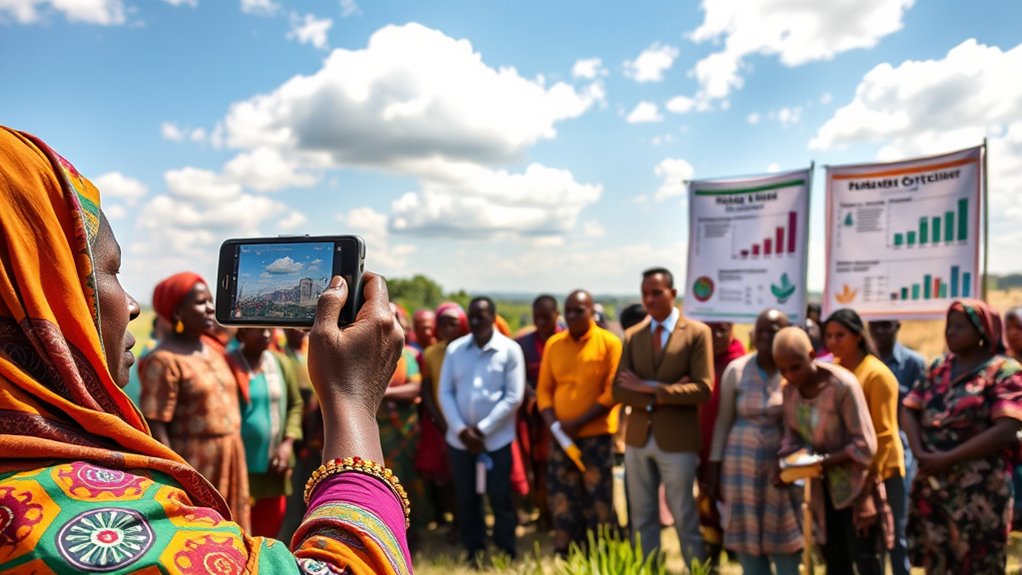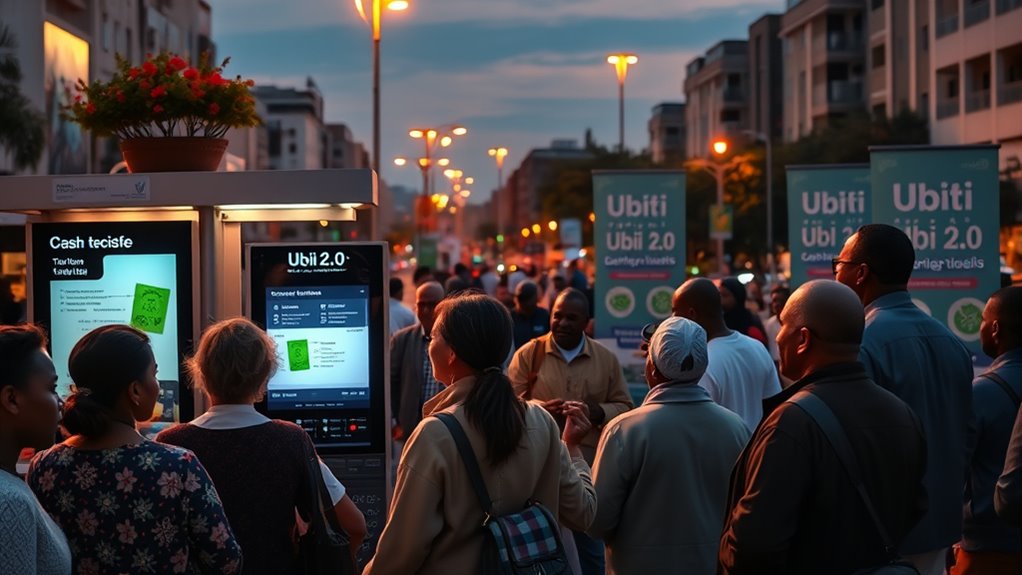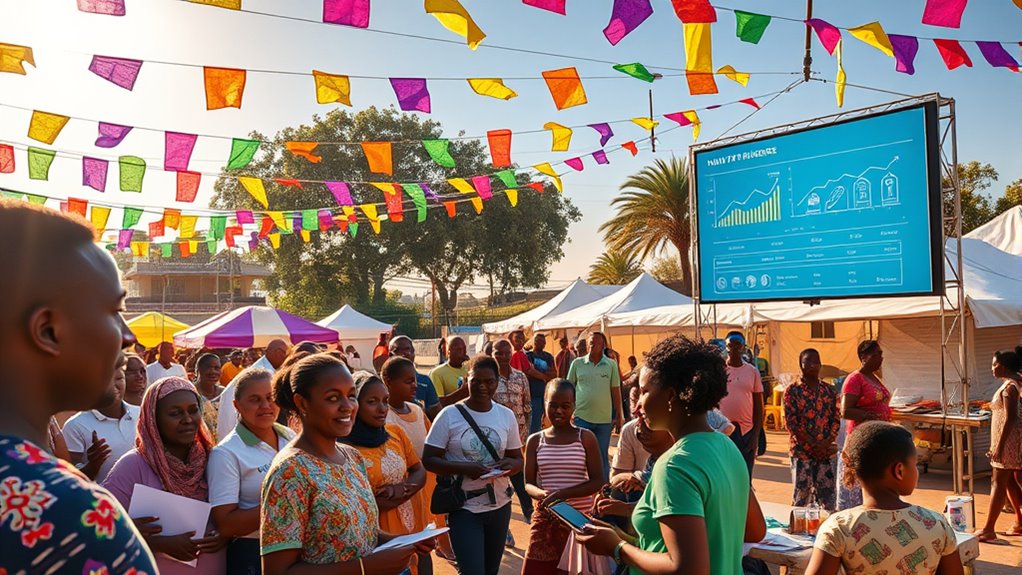Global cash pilots teach you that flexible program designs, tailored to regional needs, work best when combined with sustainable funding sources like taxes on land or resources. You’ll see that successful initiatives focus on reducing poverty, improving health, and encouraging work, often overcoming political hurdles through community engagement. If you want to understand how these lessons can shape future UBI strategies and scale effectively, there’s more to explore.
Key Takeaways
- Successful UBI pilots emphasize tailored delivery methods and community engagement to improve accessibility and acceptance.
- Diversifying funding sources, such as resource rents and multi-year grants, enhances program sustainability.
- Pilot outcomes demonstrate positive impacts on mental health, economic stability, and basic needs fulfillment.
- Combining cash transfers with complementary services like healthcare and job training amplifies long-term benefits.
- Building broad political and public support is essential for scaling UBI initiatives and ensuring financial viability.
Diverse Approaches to Universal Basic Income Globally

Around the world, countries are experimenting with different ways to implement Universal Basic Income, reflecting their unique social, economic, and technological contexts. In Africa, pilots like Namibia’s in 2008-2009 showed that even small payments can reduce child malnutrition and social crimes, while Kenya’s ongoing project aims to alleviate poverty and boost local economies. South Africa used temporary COVID-19 relief payments for vulnerable groups, and Togo’s welfare-based program improved living standards. Brazil combines welfare with pilot UBI efforts, addressing inequality. In Asia, India’s pilots increased food, healthcare, and school attendance, while personal savings and entrepreneurship grew. West Asia and the Middle East see Iran replacing subsidies with a national income, and Israel’s blockchain-based GoodDollar project explores decentralized UBI. These diverse approaches highlight varied strategies tailored to local needs. Universal basic income is characterized by its unconditional and regular cash payments, which can be adapted to different social and economic systems worldwide to address diverse challenges. Additionally, some pilots incorporate nutritional benefits, recognizing the importance of supporting overall well-being alongside income support.
Core Features and Variations in Program Design

Universal Basic Income programs vary widely in how they are designed, reflecting different goals, resources, and social contexts. Some programs cover everyone regardless of income, while others target specific groups based on age or demographics. Many maintain eligibility despite income changes, unlike conditional assistance. Others set initial criteria but offer unconditional benefits afterward. Universality can also mean regional or demographic coverage rather than blanket national inclusion. Public support for UBI has been increasing over time despite limited economist backing. Core features include unconditionality—no work or service requirements—and straightforward cash payments, often monthly. Payment amounts differ, aiming to meet basic needs, but higher amounts increase costs. Program design varies in financing methods, from taxes to reallocation, affecting economic impact. Additionally, the administrative complexity of program implementation can influence both cost and public perception.
Motivations Driving Pilot Initiatives

Pilot initiatives for basic income are driven by multiple, interconnected motivations that aim to demonstrate the potential benefits of unconditional cash transfers. These motivations include:
Pilot programs for basic income aim to showcase benefits and address economic, social, and technological challenges.
- Economic Security and Poverty Alleviation: They seek to reduce poverty, improve stability, and support marginalized populations by providing reliable funds to cover basic needs without conditions. The Chicago pilot specifically targets households at or below 100% of the federal poverty level to ensure aid reaches those most in need.
- Testing Feasibility and Program Delivery: Pilots evaluate how to effectively deliver cash at scale, identify barriers, and improve administrative processes across diverse communities. Understanding the home infrastructure and community engagement strategies] is crucial for successful implementation.]
- Labor Market Disruption and Automation: They explore whether unconditional cash can buffer the impacts of automation, help people retrain, or start new ventures as traditional jobs change or disappear.
- Social and Psychological Benefits: Providing cash aims to reduce financial stress, boost mental health, and foster a sense of agency, enabling participants to focus on long-term goals.
Documented Outcomes and Impact Assessments

Documented outcomes from UBI pilots reveal notable improvements in economic stability, health, and social well-being. You’ll see increased entrepreneurial activity, with recipients investing and earning more, and full-time employment rising from 28% to 40% in one study. Short-term UBI also positively affected economic measures without reducing work effort or increasing unhealthy behaviors. Recipients reported less anxiety and depression, better mental focus, and improved overall health, especially during COVID-19. Most funds were spent on essentials like food, utilities, and housing, with less than 1% on alcohol or cigarettes, showing responsible spending. Research studies also indicate that longer-term UBI programs lead to more sustained economic growth and financial stability. Large-scale pilots, like Kenya’s, highlight long-term impacts, despite challenges like participant retention. Overall, these outcomes demonstrate UBI’s potential to foster economic resilience, health, and social empowerment. Additionally, nutrient-rich ingredients in some pilot programs have been linked to improved health outcomes among recipients, further emphasizing the multifaceted benefits of basic income initiatives.
Innovative Funding and Sustainability Strategies

Innovative funding approaches are shaping the future of UBI programs by seeking sustainable and scalable models. To do this, you need to explore diverse sources that go beyond traditional tax-based funding. Consider these strategies:
- Leveraging land and resource rents as steady revenue streams.
- Relying on charitable donations and decentralized funding from nonprofits like GiveDirectly.
- Securing multi-year grants from philanthropists and international donors.
- Using hybrid models that combine government, private, and philanthropic support for long-term sustainability.
Resource and land rents can provide consistent, long-term income for UBI programs, reducing reliance on volatile tax revenues. These approaches help address resistance to tax increases and ensure programs can operate over extended periods. By focusing on sustainable funding, you can create scalable UBI models that deliver consistent economic benefits without overburdening public finances.
Policy Evolution and Political Challenges

Implementing UBI faces significant policy evolution and political hurdles, as governments must navigate complex economic and social considerations. You’ll find that designing programs is challenging because a flat payment often doesn’t meet the diverse needs of recipients. Many proposals incorporate supplementary benefits, but funding remains a major obstacle, risking budget strain without major tax reforms. Globally, success varies, requiring localized policy adaptations. Politically, funding is a key issue; high costs threaten feasibility, and critics worry about reduced work incentives and the impact on existing welfare systems. Public skepticism and parliamentary opposition further complicate adoption, as many see UBI as unaffordable or ineffective. As automation accelerates, policymakers grapple with balancing social protection, economic stability, and political support, making UBI’s future uncertain. Cost estimates suggest that the financial burden could be substantial, making sustainable funding strategies crucial for long-term viability.
Lessons Learned From Pilot Implementation

You’ve learned that customizing program delivery guarantees more effective reach and engagement. Funding models often face challenges, especially around sustainable sources and political support, which can hinder scaling. To make UBI sustainable long-term, you need to address these issues early and plan for gradual expansion. Experiments have shown that building broad-based political and public support is crucial for long-term sustainability. Additionally, fostering creative practice and encouraging innovative approaches can help adapt policies to changing social needs and increase resilience in implementation strategies.
Tailoring Program Delivery
Tailoring program delivery is essential to guarantee that universal basic income (UBI) pilots effectively meet the diverse needs of different communities. You must consider local context, infrastructure, and stakeholder engagement to optimize outcomes. Key lessons include:
- Adapt to regional differences, such as rural versus urban needs, for more relevant support.
- Leverage technology wisely by choosing accessible digital payment methods that respect privacy.
- Adjust payment amounts and schedules based on local living costs and participant preferences to promote trust and stability.
- Combine cash transfers with complementary services like job training or healthcare to deepen impact and address structural barriers.
- Monitor and evaluate pilot results continuously to refine delivery methods based on feedback and changing circumstances. Data on pilot outcomes helps ensure programs remain effective and responsive.
- Incorporating insights from divorce guidance can improve stakeholder engagement strategies, especially when addressing diverse community needs.
These strategies help you design flexible, responsive programs that better serve varied populations.
Funding Mechanism Challenges
Funding mechanisms for UBI face significant challenges that can threaten the sustainability and effectiveness of pilot programs. Implementing a $1,000 monthly UBI in a large economy like the U.S. could cost over $3 trillion annually, raising concerns about fiscal sustainability. You might consider funding through higher taxes on the wealthy or corporations, sovereign wealth funds, or redistributing existing welfare funds. However, opposition often stems from resistance to tax hikes by individuals and businesses. Inflation risks are also critical; large cash transfers can increase demand, driving prices up and eroding UBI’s value, especially for poorer regions. Global poverty affects over 8% of the population, making large-scale UBI programs even more complex to finance effectively. Balancing generous benefits with economic growth and smart tax policies is essential to avoid deficits and inflation, making funding a complex but crucial aspect of UBI pilot success. Additionally, funding sustainability remains a key concern, requiring innovative financial strategies to ensure long-term viability.
Scaling and Sustainability
Successfully scaling Universal Basic Income (UBI) pilots depends on how well they integrate with existing social systems and community structures. To guarantee sustainability, focus on these key aspects:
- Align with current welfare programs to prevent overlaps, reduce administrative burdens, and improve access.
- Engage communities early, building trust through transparency and involving local leaders to boost legitimacy.
- Collect extensive data over time, measuring impacts on health, food security, and inequality to guide adjustments.
- Secure political backing by demonstrating cost-effectiveness and embedding pilots within broader policy frameworks.
Future Directions and Scalability Considerations

As the concept of Universal Basic Income (UBI) moves toward broader implementation, addressing future directions and scalability becomes essential for realizing its full potential. You’ll need to consider technological innovations that streamline payments and data analysis, making programs more efficient. Debates around targeted versus universal approaches will influence how funds are allocated and who benefits most. Program adaptation is critical to ensure flexibility in diverse contexts, while funding models must balance costs with long-term benefits like poverty reduction and economic stimulation. Scaling UBI requires overcoming logistical hurdles, such as budget size and administrative capacity, and securing political support through legislative reforms. Monitoring and evaluation will remain vital, providing data to refine programs and demonstrate their value for sustainable, large-scale adoption. Additionally, integrating digital tools like mobile banking and biometric identification can significantly improve the delivery and transparency of cash transfers enhancing program efficiency and trust. Furthermore, lessons from successful nutritional initiatives and pilot projects across different regions can inform scalable solutions and best practices for broad UBI deployment.
Frequently Asked Questions
How Do Different Cultural Contexts Influence UBI Design and Acceptance?
Different cultural contexts shape how you design and accept UBI by influencing societal values, work ethics, and social norms. If your society highly values work, support for UBI might be lower, and programs could focus on targeted assistance. Cultural perceptions about social welfare and community involvement also affect acceptance. You need to tailor UBI approaches to fit these cultural differences for better acceptance and effectiveness across diverse societies.
What Are the Long-Term Economic Impacts of Large-Scale UBI Programs?
Think of UBI as a double-edged sword shaping your economy’s future. In the long run, large-scale programs might slow workforce growth, like a river losing its flow, but they can also boost human capital, fueling innovation. If carefully balanced, UBI can expand savings and consumption, fostering resilience. However, if unchecked, it risks dampening labor incentives and straining fiscal resources, threatening sustainable growth.
How Do Pilots Address Potential Inflationary Effects of Cash Transfers?
You should recognize that pilots often design cash transfers carefully to minimize inflation risks. They limit transfer sizes, target lower-income groups, and adjust transfer frequency to prevent demand overheating. Monitoring inflation closely and implementing complementary policies like supply support help keep prices stable. By considering local economic conditions and securing transparent communication, you can guarantee cash transfers boost well-being without triggering significant inflation.
What Role Do Technological Innovations Play in Delivering and Managing UBI?
Did you know that digital payment methods can increase UBI distribution efficiency by up to 30%? You play a vital role in how technological innovations deliver and manage UBI. You rely on digital platforms, mobile payments, and blockchain to guarantee secure, transparent transactions. Advanced data analytics help monitor outcomes, while AI and automation reduce costs and improve accuracy. Together, these innovations make UBI more accessible, efficient, and reliable for everyone.
How Can Policymakers Ensure Equitable Access Across Diverse Populations?
You can guarantee equitable access across diverse populations by designing programs that are inclusive and culturally sensitive. Collaborate with local communities to understand unique needs, and tailor assistance accordingly. Use targeted initiatives for marginalized groups, and incorporate feedback to improve accessibility. Employ digital platforms to reach remote areas, and establish clear policies that prioritize fairness. Regularly evaluate and adapt your approach to address gaps and promote fairness for all recipients.
Conclusion
As you reflect on these global cash pilots, picture a world where every hand receives a gentle, steady stream of support—like sunlight nourishing new growth. The lessons learned reveal the delicate dance of design, funding, and politics shaping UBI’s future. With each pilot, you witness seeds of change taking root, promising a landscape where economic security blossoms into a resilient, inclusive horizon. Embrace these insights as you help cultivate a more equitable tomorrow.









